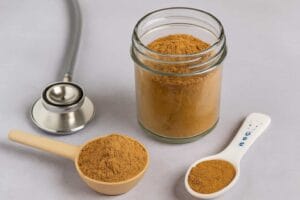When it comes to natural remedies for glowing, healthy skin, Chaga tea for skin has been gaining significant attention. Derived from a unique fungus that grows primarily on birch trees, Chaga has been used for centuries in traditional medicine, prized for its antioxidant properties and potential skin benefits. If you’re exploring holistic ways to improve your complexion and overall skin vitality, understanding how Chaga tea fits into your wellness routine can be illuminating. For those curious about how natural fungi compare in health benefits, you might also find this comparison between mushroom gummies vs enoki mushroom for gut health insightful.
Why Chaga Tea for Skin is Becoming a Skincare Staple
Chaga (Inonotus obliquus) is a type of mushroom that thrives in cold climates and has been used in Siberian and other northern folk medicines for centuries. Its rich composition of antioxidants, vitamins, and minerals makes it a powerful ally for skin health. Drinking Chaga tea allows you to tap into these benefits in a convenient, soothing form.
One of the primary reasons Chaga tea for skin is so popular is its high level of superoxide dismutase (SOD), an enzyme that helps combat oxidative stress. Oxidative stress is a major contributor to skin aging, causing wrinkles, fine lines, and dullness. By reducing free radicals, Chaga tea helps maintain skin elasticity and a youthful glow.
Key Nutrients in Chaga Tea That Support Skin Health
Chaga tea contains a variety of bioactive compounds that nourish the skin from within. Here’s a breakdown of some of the most important nutrients and their skin benefits:
| Nutrient/Compound | Skin Benefit |
|---|---|
| Antioxidants (Polyphenols, Melanin) | Protect skin cells from damage and reduce inflammation |
| Superoxide Dismutase (SOD) | Neutralizes free radicals, slowing premature aging |
| Beta-D-Glucans | Boost skin hydration and support immune defense |
| Vitamin D | Promotes skin repair and regeneration |
| Minerals (Potassium, Zinc) | Maintain skin moisture balance and aid healing |
How Chaga Tea Enhances Your Skin’s Natural Glow
Drinking Chaga tea regularly can contribute to skin health in several ways:
- Fights Inflammation: Chronic inflammation can lead to skin conditions like eczema and acne. The anti-inflammatory compounds in Chaga help reduce redness and soothe irritated skin.
- Supports Collagen Production: Collagen is essential for skin firmness. Antioxidants in Chaga protect collagen from breakdown, helping to maintain elasticity.
- Hydrates Skin: Beta-glucans found in Chaga help lock in moisture, preventing dryness and flakiness.
- Detoxifies the Skin: Chaga’s natural compounds aid in flushing out toxins that can cause dullness and blemishes.
Incorporating Chaga tea into your routine can complement topical skincare products, offering a holistic approach to achieving radiant skin. For those interested in exploring other mushroom-based options for nutrition and skin health, this article on mushroom gummies vs porcini mushroom for nutritional benefits provides useful insights.
How to Brew and Enjoy Chaga Tea for Skin Benefits
Preparing Chaga tea is simple, but quality and brewing time make a big difference in maximizing skin benefits:
- Choose Quality Chaga: Look for sustainably harvested, wild Chaga chunks or powder from reputable suppliers.
- Simmer Slowly: Place Chaga pieces in cold water and simmer on low heat for 1.5 to 3 hours. This slow extraction releases antioxidants and nutrients.
- Strain and Serve: Strain the tea and enjoy it warm. You can add natural sweeteners like honey or cinnamon for flavor.
- Daily Consumption: Drinking 1-2 cups daily is generally recommended to experience skin benefits.
Chaga tea’s earthy, slightly bitter flavor may take some getting used to, but many find it a calming ritual that supports overall wellness beyond skin health.
Potential Precautions When Using Chaga Tea for Skin and Health
While Chaga tea offers many benefits, it’s important to be mindful of potential interactions and side effects:
- Blood Thinners: Chaga may affect blood clotting, so those on blood-thinning medications should consult their doctor before use.
- Autoimmune Conditions: Since Chaga can stimulate the immune system, it might not be suitable for people with autoimmune disorders.
- Allergic Reactions: Though rare, some individuals may experience allergic responses.
- Pregnancy and Breastfeeding: Safety data is limited, so it’s best to avoid use during these periods unless advised by a healthcare professional.
As with any supplement, starting with small amounts and monitoring your body’s response is wise.
F.A.Q
- Is Chaga tea effective for improving skin appearance?
Yes, Chaga tea for skin is effective due to its high antioxidant content that helps fight free radicals, reducing signs of aging and promoting a healthy glow. - How long does it take to see skin benefits from drinking Chaga tea?
Most people notice improvements in skin hydration and texture within a few weeks of regular consumption, but results can vary based on individual skin type and lifestyle. - Can Chaga tea be used topically for skin care?
While Chaga extracts are sometimes included in topical skincare, most benefits come from drinking the tea. Drinking Chaga tea for skin provides systemic antioxidant support that topical applications may not fully deliver. - Are there any side effects of drinking Chaga tea?
Side effects are uncommon but may include allergic reactions or interactions with medications, especially blood thinners. Consulting a healthcare provider is recommended if you have existing health concerns. - Where can I learn more about the health benefits of Chaga tea for skin and overall wellness?
For a comprehensive overview of Chaga’s health benefits, including its effects on skin, you can visit this detailed article on Healthline’s Chaga Mushroom Guide. Additionally, for heart health comparisons of different mushroom supplements, check out this internal resource on mushroom gummies vs oyster mushroom for heart health.



